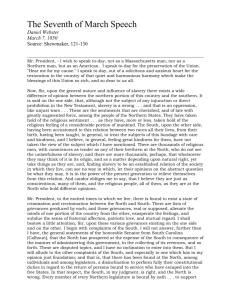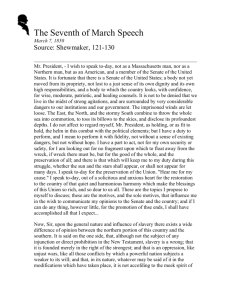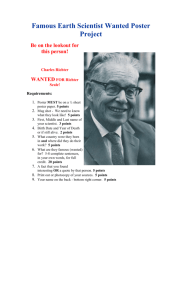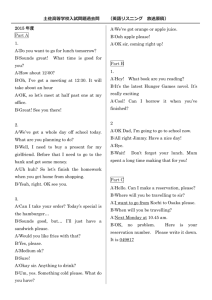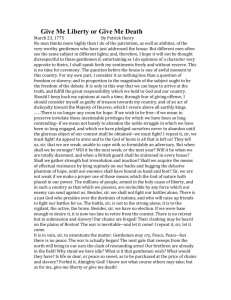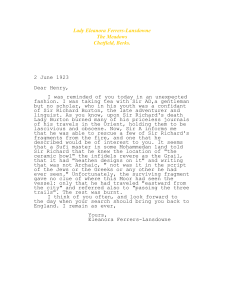The Seventh of March Speech
advertisement
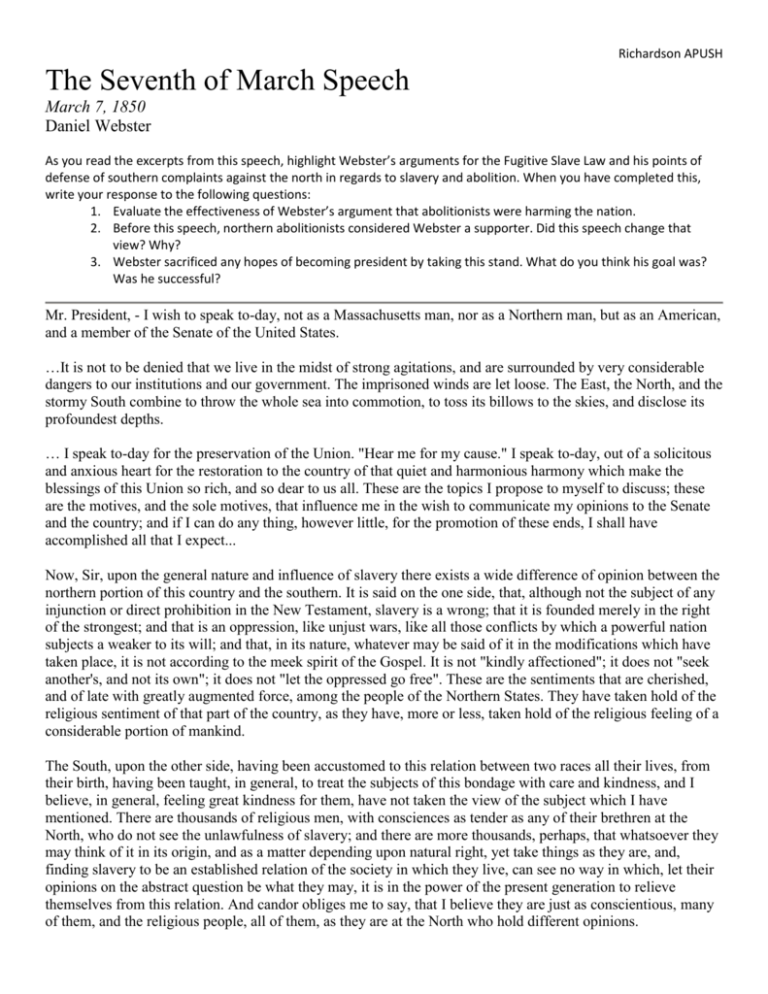
Richardson APUSH The Seventh of March Speech March 7, 1850 Daniel Webster As you read the excerpts from this speech, highlight Webster’s arguments for the Fugitive Slave Law and his points of defense of southern complaints against the north in regards to slavery and abolition. When you have completed this, write your response to the following questions: 1. Evaluate the effectiveness of Webster’s argument that abolitionists were harming the nation. 2. Before this speech, northern abolitionists considered Webster a supporter. Did this speech change that view? Why? 3. Webster sacrificed any hopes of becoming president by taking this stand. What do you think his goal was? Was he successful? Mr. President, - I wish to speak to-day, not as a Massachusetts man, nor as a Northern man, but as an American, and a member of the Senate of the United States. …It is not to be denied that we live in the midst of strong agitations, and are surrounded by very considerable dangers to our institutions and our government. The imprisoned winds are let loose. The East, the North, and the stormy South combine to throw the whole sea into commotion, to toss its billows to the skies, and disclose its profoundest depths. … I speak to-day for the preservation of the Union. "Hear me for my cause." I speak to-day, out of a solicitous and anxious heart for the restoration to the country of that quiet and harmonious harmony which make the blessings of this Union so rich, and so dear to us all. These are the topics I propose to myself to discuss; these are the motives, and the sole motives, that influence me in the wish to communicate my opinions to the Senate and the country; and if I can do any thing, however little, for the promotion of these ends, I shall have accomplished all that I expect... Now, Sir, upon the general nature and influence of slavery there exists a wide difference of opinion between the northern portion of this country and the southern. It is said on the one side, that, although not the subject of any injunction or direct prohibition in the New Testament, slavery is a wrong; that it is founded merely in the right of the strongest; and that is an oppression, like unjust wars, like all those conflicts by which a powerful nation subjects a weaker to its will; and that, in its nature, whatever may be said of it in the modifications which have taken place, it is not according to the meek spirit of the Gospel. It is not "kindly affectioned"; it does not "seek another's, and not its own"; it does not "let the oppressed go free". These are the sentiments that are cherished, and of late with greatly augmented force, among the people of the Northern States. They have taken hold of the religious sentiment of that part of the country, as they have, more or less, taken hold of the religious feeling of a considerable portion of mankind. The South, upon the other side, having been accustomed to this relation between two races all their lives, from their birth, having been taught, in general, to treat the subjects of this bondage with care and kindness, and I believe, in general, feeling great kindness for them, have not taken the view of the subject which I have mentioned. There are thousands of religious men, with consciences as tender as any of their brethren at the North, who do not see the unlawfulness of slavery; and there are more thousands, perhaps, that whatsoever they may think of it in its origin, and as a matter depending upon natural right, yet take things as they are, and, finding slavery to be an established relation of the society in which they live, can see no way in which, let their opinions on the abstract question be what they may, it is in the power of the present generation to relieve themselves from this relation. And candor obliges me to say, that I believe they are just as conscientious, many of them, and the religious people, all of them, as they are at the North who hold different opinions. Richardson APUSH … Sir, when a question of this kind seizes on the religious sentiments of mankind, and comes to be discussed in religious assemblies of the clergy and laity, there is always to be expected, or always to be feared a great degree of excitement. It is in the nature of man, manifested in his whole history, that religious disputes are apt to become warm in proportion to the strength of the convictions which men entertain of the magnitude of the questions at issue. In all such disputes, there will sometimes be found men with whom every thing is absolute; absolutely wrong, or absolutely right. They see the right clearly; they think others ought so to see it, and they are disposed to establish a broad line of distinction between what is right and what is wrong. …Mr. President, in the excited times in which we live, there is found to exist a state of crimination and recrimination between the North and South. There are lists of grievances produced by each; and those grievances, real or supposed, alienate the minds of one portion of the country from the other, exasperate the feelings, and subdue the sense of fraternal affection, patriotic love, and mutual regard. …I begin with complaints of the South. … the general statements of the honorable Senator from South Carolina [Calhoun], that the North has prospered at the expense of the South in consequence of the manner of administering this government, in the collecting of its revenues, and so forth. …there has been found at the North, among individuals and among legislators, a disinclination to perform fully their constitutional duties in regard to the return of persons bound to service who have escaped into the free States. In that respect, the South, in my judgment, is right, and the North is wrong. Every member of every Northern legislature is bound by oath, like every other officer in the country, to support the Constitution of the United States; and the article of the Constitution which says to these States that they shall deliver up fugitives from service is as binding in honor and conscience as any other article. … And I desire to call the attention of all sober-minded men at the North, of all conscientious men, of all men who are not carried away by some fanatical idea or some false impression, to their constitutional obligations. I put it to all the sober and sound minds at the North as a question of morals and a question of conscience. What right have they, in their legislative capacity or any other capacity, to endeavor to get round this Constitution, or to embarrass the free exercise of the rights secured by the Constitution to the persons whose slaves escape from them? None at all; none at all. …I say that the South has been injured in this respect, and has a right to complain; and the North has been too careless of what I think the Constitution peremptorily and emphatically enjoins upon her as a duty... Then, Sir, there are the Abolition societies, of which I am unwilling to speak, but in regard to which I have very clear notions and opinions. I do not think them useful. I think their operations for the last twenty years have produced nothing good or valuable. At the same time, I believe thousands of their members to be honest and good men, perfectly well-meaning men. They have excited feelings; they think they must do something for the cause of liberty; ... I cannot but see what mischiefs their interference with the South has produced. …As has been said by the honorable member from South Carolina [Calhoun], these Abolition societies commenced their course of action in 1835. It is said, I do not know how true it may be, that they sent incendiary publications into the slave States; at any rate, they attempted to arouse, and did arouse, a very strong feeling; in other words, they created great agitation in the North against Southern slavery. Well, what was the result? The bonds of the slave were bound more firmly than before, their rivets were more strongly fastened. Public opinion, which in Virginia had begun to be exhibited against slavery, and was opening out for the discussion of the question, drew back and shut itself up in its castle. Richardson APUSH … I hear with distress and anguish the word "secession," especially when it falls from the lips of those who are patriotic, and known to the country, and known all over the world, for their political services. Secession! Peaceable secession! Sir, your eyes and mine are never destined to see that miracle. The dismemberment of this vast country without convulsion! The breaking up of the fountains of the great deep without ruffling the surface! Who is so foolish, I beg every body's pardon, as to expect to see any such thing? Sir, he who sees these States, now revolving in harmony around a common centre, and expects to see them quit their places and fly off without convulsion, may look the next hour to see heavenly bodies rush from their spheres, and jostle against each other in the realms of space, without causing the wreck of the universe. There can be no such thing as peaceable secession. Peaceable secession is an utter impossibility. Is the great Constitution under which we live, covering this whole country, is it to be thawed and melted away by secession, as the snows on the mountain melt under the influence of a vernal sun, disappear almost unobserved, and run off? No, Sir! No, Sir! I will not state what might produce the disruption of the Union; but, Sir, I see as plainly as I see the sun in heaven what that disruption itself must produce; I see that it must produce war, and such a war as I will not describe, in its twofold character. Peaceable secession! Peaceable secession! The concurrent agreement of all the members of this great republic to separate! A voluntary separation, with alimony on one side and on the other. Why, what would be the result? Where is the line to be drawn? What States are to seceded? What is to remain American? What am I to be? An American no longer? Am I to become a sectional man, a local man, a separatist, with no country in common with the gentlemen who sit around me here, or who fill the other house of Congress? Heaven forbid! Where is the flag of the republic to remain? Where is the eagle still to tower? Or is he to cower, and shrink, and fall to the ground? Why, Sir, our ancestors, our fathers and our grandfathers, those of them that are yet living amongst us with prolonged lives, would rebuke and reproach us; and our children and our grandchildren would cry out shame upon us, if we of this generation should dishonor these ensigns of the power of the government and the harmony of that Union which is every day felt among us with so much joy and gratitude. What is to become of the army? What is to become of the navy? What is to become of the public lands? How is each of the thirty States to defend itself? I know, although the idea has not been stated distinctly, there is to be, or it is supposed possible that there will be, a Southern Confederacy. I do not mean, when I allude to this statement, that any one seriously contemplates such a state of things. I do not mean to say that it is true, but I have heard it suggested elsewhere, that the idea has been entertained, that, after the dissolution of this Union, a Southern Confederacy might be formed. I am sorry, Sir, that it has ever been thought of, talked of, or dreamed of, in the wildest flights of human imagination. But the idea, so far as it exists, must be of a separation, assigning the slave States to one side and the free States to the other. Sir, I may express myself too strongly, perhaps, but there are impossibilities in the natural as well as in the physical world, and I hold the idea of a separation of these States, those that are free to form one government, and those that are slave-holding to form another, as such an impossibility. We could not separate the States by any such line, if we were to draw it. We could not sit down here to-day and draw a line of separation that would satisfy any five men in the country. There are natural causes that would keep and tie us together, and there are social and domestic relations which we could not break if we would, and which we should not if we could. Richardson APUSH Sir, nobody can look over the face of this country at the present moment, nobody can see where its population is the most dense and growing, without being ready to admit, and compelled to admit, that ere long the strength of America will be in the Valley of the Mississippi. Well, now, Sir, I beg to inquire what the wildest enthusiast has to say about the possibility of cutting that river in two, and leaving free States at its source and on its branches, and slave States down near its mouth, each forming a separate government? Pray, Sir, let me say to the people of this country, that these things are worthy of their pondering and of their consideration. Here, Sir, are five millions of freemen in the free States north of the river of Ohio. Can any body suppose that this population can be severed, by a line that divides them fro the territory of a foreign and alien government, down somewhere, the Lord knows where, upon the lower banks of the Mississippi? What would become of Missouri? Will she join the arrondissement of the slave States? Shall the man from the Yellow Stone and the Platte be connected, in the new republic, with the man who lives on the southern extremity of the Cape of Florida? Sir, I am ashamed to pursue this line of remark. I dislike it, I have an utter disgust for it. I would rather hear of natural blasts and mildews, war, pestilence, and famine, than to hear gentlemen talk of secession. To break up this great government! to dismember this glorious country! to astonish Europe with an act of folly such as Europe for two centuries has never beheld in any government or any people! No, Sir! no, Sir! There will be no secession! Gentlemen are not serious when they talk of secession... … Let us make our generation one of the strongest and brightest links in that golden chain which is destined, I fondly believe, to grapple the people of all the States to this Constitution for ages to come. We have a great, popular, constitutional government, guarded by law and by judicature, and defended by the affections of the whole people. No monarchical throne presses these States together, no iron chain of military power encircles them; they live and stand under a government popular in its form, representative in its character, founded upon principles of equality, and so constructed, we hope, as to last for ever. In all its history it has been beneficent; it has trodden down no man's liberty; it has crushed no State. Its daily respiration is liberty and patriotism; its yet youthful veins are full of enterprise, courage, and honorable love of glory and renowned. Large before, the country has now, by recent events become vastly larger. This republic now extends, with a vast breadth, across the whole continent. The two great seas of the world wash the one and the other shore. We realize, on a mighty scale, the beautiful description of the ornamental border of the buckler of Achilles: "Now, the broad shield completed, the artist crowned With his last hand, and poured the ocean round; In living silver seemed the was to roll, And beat the bucklers verge, and bound the whole."
